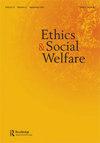The Afterlife of Decriminalisation: Anti-trafficking, Child Protection, and the Limits of Trauma-informed Efforts
IF 0.9
Q4 SOCIAL WORK
引用次数: 2
Abstract
ABSTRACT Numerous laws have passed to move away from criminalising youth who trade sex. Specialised courts have also been established to support youth. Despite proponents' contention that specialised, trauma-informed courts are less punitive than typical interventions, research is limited. This article explores one specialised dependency court's efforts to assist youth ‘at risk’. Drawing on interviews and ethnographic observations, I argue that laws and trauma-informed court interventions intensify the supervision of youth and families while inadvertently concealing the gendered-racialised effects of child welfare system involvement. Ethnographic findings contribute to sociolegal and anti-carceral feminist research on carceral control beyond the criminal legal system. This work also explores the ethics of carceral-trauma entanglements that accompany decriminalisation’s afterlife.非犯罪化的来世:反贩卖,儿童保护,以及创伤知情努力的局限性
许多法律已经通过,不再将从事性交易的青少年定为犯罪。还设立了专门法庭来支持青年。尽管支持者认为,专门的、了解创伤情况的法庭比典型的干预措施更具惩罚性,但研究是有限的。这篇文章探讨了一个专门的抚养法庭为帮助“处于危险中的”青少年所做的努力。根据采访和人种学观察,我认为法律和创伤知情的法庭干预加强了对青少年和家庭的监督,同时无意中掩盖了儿童福利系统参与的性别种族化影响。人种学的研究结果有助于社会法律和反犯罪女性主义对刑事法律体系之外的犯罪控制的研究。这项工作也探讨了道德的创伤纠缠,伴随着非刑事化的死。
本文章由计算机程序翻译,如有差异,请以英文原文为准。
求助全文
约1分钟内获得全文
求助全文
来源期刊

Ethics and Social Welfare
SOCIAL WORK-
CiteScore
1.60
自引率
20.00%
发文量
36
期刊介绍:
Ethics and Social Welfare publishes articles of a critical and reflective nature concerned with the ethical issues surrounding social welfare practice and policy. It has a particular focus on social work (including practice with individuals, families and small groups), social care, youth and community work and related professions. The aim of the journal is to encourage dialogue and debate across social, intercultural and international boundaries on the serious ethical issues relating to professional interventions into social life. Through this we hope to contribute towards deepening understandings and further ethical practice in the field of social welfare. The journal welcomes material in a variety of formats, including high quality peer-reviewed academic papers, reflections, debates and commentaries on policy and practice, book reviews and review articles. We actively encourage a diverse range of contributions from academic and field practitioners, voluntary workers, service users, carers and people bringing the perspectives of oppressed groups. Contributions might include reports on research studies on the influence of values and ethics in social welfare practice, education and organisational structures, theoretical papers discussing the evolution of social welfare values and ethics, linked to contemporary philosophical, social and ethical thought, accounts of ethical issues, problems and dilemmas in practice, and reflections on the ethics and values of policy and organisational development. The journal aims for the highest standards in its published material. All material submitted to the journal is subject to a process of assessment and evaluation through the Editors and through peer review.
 求助内容:
求助内容: 应助结果提醒方式:
应助结果提醒方式:


